 is proud to republish this excellent report from the March-April
issue of Fairness
and Accuracy in Reporting’s Extra! Magazine. We don’t know
how we missed this gem, earlier.
is proud to republish this excellent report from the March-April
issue of Fairness
and Accuracy in Reporting’s Extra! Magazine. We don’t know
how we missed this gem, earlier.
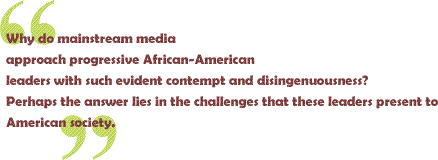
It
is appropriate for reporters and pundits to challenge, criticize
and disagree with public figures of all races; indeed, it is a
central part of their jobs. At the same time, media commentators
should avoid name-calling, stereotypes and other distractions
from substantive discussion about ideas or proposals; represent
people’s ideas and statements fairly; and portray their actions
and beliefs accurately. Sadly, when it comes to African-American
leaders who challenge the status quo, such as the Rev. Jesse Jackson,
the Rev. Al Sharpton and professor and author Cornel West, these
standards are frequently violated – including, in some cases,
by African-American commentators.
 Discussing
these public figures on the opinion pages, critics often use demeaning
terms, with some labels ridiculing these African-American spokespersons
for seeking to be public figures in the first place. Jesse Jackson
is a "publicity hound," declared Mickey Edwards of the
Boston Herald (4/18/01) and Steve Barrett of the Chattanooga
Times/Chattanooga Free Press (9/13/02). In a similar
vein, the New York Observer (4/29/02) pronounced Cornel
West a "publicity-loving con man." At times, more
Discussing
these public figures on the opinion pages, critics often use demeaning
terms, with some labels ridiculing these African-American spokespersons
for seeking to be public figures in the first place. Jesse Jackson
is a "publicity hound," declared Mickey Edwards of the
Boston Herald (4/18/01) and Steve Barrett of the Chattanooga
Times/Chattanooga Free Press (9/13/02). In a similar
vein, the New York Observer (4/29/02) pronounced Cornel
West a "publicity-loving con man." At times, more 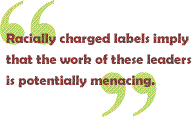 explicitly
racial terms are used for ridicule, as when Rod Dreher of the
National Review Online (1/4/02) pronounced West a "clownish
minstrel." Such slurs do nothing to advance debate about
these figures' ideas. Indeed, they serve to dismiss their message
before any real consideration of the issues they raise.
explicitly
racial terms are used for ridicule, as when Rod Dreher of the
National Review Online (1/4/02) pronounced West a "clownish
minstrel." Such slurs do nothing to advance debate about
these figures' ideas. Indeed, they serve to dismiss their message
before any real consideration of the issues they raise.
Other
racially charged labels imply that the work of these leaders is
potentially menacing. Jackson is a "race hustler," according
to Don Feder (Boston Herald, 1/2/02) and Phil Kent (Augusta
Chronicle, 1/28/01). George Will (Washington Post,
10/21/01) and the Washington Times (6/20/00) apply the
same label to Sharpton; John J. Miller (National Review,
10/14/02) uses it to describe both men. Jackson and Sharpton's
discussions of racism, such treatment suggests, are not legitimate
critiques of society, but rather fraudulent attempts to trick
the white public.
Attacking
style, ignoring substance
Rather
than address the messages of African-American leaders, commentators
often belittle their appearance or speech. Instead of offering
principled consideration of Sharpton’s protest of U.S. military
exercises in 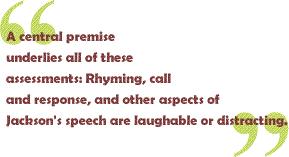 Vieques,
Puerto Rico, for which he spent time in jail, Stanley Crouch (New
York Daily News, 6/1/01) offered a trivializing reference
to Sharpton’s appearance: "I think he may be more concerned
about his time behind bars because he might not be able to get
his hair done." Similarly, Philip Terzian (Providence
Journal, 1/26/03) notes sarcastically of Sharpton’s potential
presidential candidacy, "With his jumpsuits, medallions,
bigoted pronouncements, flowing John C. Calhoun locks and historic
attachment to the Tawana Brawley hoax, Sharpton could not be a
more suitable Democratic candidate."
Vieques,
Puerto Rico, for which he spent time in jail, Stanley Crouch (New
York Daily News, 6/1/01) offered a trivializing reference
to Sharpton’s appearance: "I think he may be more concerned
about his time behind bars because he might not be able to get
his hair done." Similarly, Philip Terzian (Providence
Journal, 1/26/03) notes sarcastically of Sharpton’s potential
presidential candidacy, "With his jumpsuits, medallions,
bigoted pronouncements, flowing John C. Calhoun locks and historic
attachment to the Tawana Brawley hoax, Sharpton could not be a
more suitable Democratic candidate."
The
misleading description of Sharpton’s ostensibly unconventional
appearance (he's actually been wearing three-piece suits at public
appearances for some time now) is all that Terzian offers by way
of a contemporary critique of the candidate. No examples of the
so-called "bigoted pronouncements" are given, and nowhere
in the editorial does Terzian discuss any of Sharpton’s recent
causes or the ideas he might bring to a political campaign.
Commentators
frequently mock Jackson’s verbal style. He "regularly substitutes
rhymes for reason," according to Feder (Boston Herald,
1/10/01). Discussing Jackson’s offer to meet with Middle East
leaders, the New York Observer (8/12/02) suggested he had
"nothing to offer but empty  words
and rhymes." Mike Rosen of the Rocky Mountain News
(1/26/01) concluded a list of Jackson’s supposed political sins
with a reference to his "bad rhymes." Pam Belluck remarked
in the New York Times (3/26/01) that Jackson’s "call-and-response
cadences make him very effective at stirring people but can also
obscure his detailed knowledge of complex issues."
words
and rhymes." Mike Rosen of the Rocky Mountain News
(1/26/01) concluded a list of Jackson’s supposed political sins
with a reference to his "bad rhymes." Pam Belluck remarked
in the New York Times (3/26/01) that Jackson’s "call-and-response
cadences make him very effective at stirring people but can also
obscure his detailed knowledge of complex issues."
While
Belluck’s comments are more sympathetic than those of her colleagues,
a central premise underlies all of these assessments: Rhyming,
call and response, and other aspects of Jackson’s speech are laughable
or distracting. Patricia Sullivan, a professor of communications
at the State 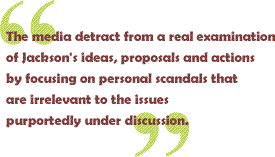 University
of New York at New Paltz, argued (Communication Quarterly,
Winter/93) that the media’s negative assessments of Jackson’s
speech demonstrated that they did not understand "the oral
tradition he represent[s]," which values rhythm and interaction
between audience and speaker. Sullivan maintained that unless
critics began to "examine their assumptions," African-American
leaders such as Jackson would "continue to be marginalized
and muted on the American political stage." Regrettably,
almost a decade after her warning, not much has changed.
University
of New York at New Paltz, argued (Communication Quarterly,
Winter/93) that the media’s negative assessments of Jackson’s
speech demonstrated that they did not understand "the oral
tradition he represent[s]," which values rhythm and interaction
between audience and speaker. Sullivan maintained that unless
critics began to "examine their assumptions," African-American
leaders such as Jackson would "continue to be marginalized
and muted on the American political stage." Regrettably,
almost a decade after her warning, not much has changed.
The
media also detract from a real examination of Jackson’s ideas,
proposals and actions by focusing on personal scandals that are
irrelevant to the issues purportedly under discussion. The Boston
Herald (9/29/01) brought up Jackson’s out-of-wedlock child
in an editorial dealing with his proposal to negotiate with the
Taliban; columnists Don Feder (Boston Herald, 1/9/02) and
Mary McGrory (Washington Post, 1/6/02) inserted the fact
into commentaries about his support of Cornel West. While commentary
on Jackson’s personal life might be relevant in some contexts,
these gratuitous references in articles about unrelated topics
demonstrate that some commentators are more interested in discrediting
him than in offering the public any meaningful discussion of the
issues he raises.
Jackson’s
personal life can even be used to disparage Sharpton. On Fox
News Channel’s Special Report with Brit Hume (1/7/02),
Hume commented on the opening of the West Coast office of Sharpton’s
National Action Network in Los Angeles: "There was a special
guest at a private party to commemorate the event. It was Karen
Stanford, former mistress of Sharpton rival, Jesse Jackson, and
the mother of Jackson's two-year-old, out-of-wedlock daughter.
Stanford told NewsMax.com that Sharpton is - quote - ‘the
only civil rights leader I respect and support' - end quote."
No information about the National Action Network or Sharpton’s
work with the organization was given.
Distorting
the record

Reviewing
Sharpton’s book Al on America in the National Review Online
(10/8/02), Rod Dreher remarked that Sharpton presented positions
"without a semblance of sustained, fact-based argument."
As an example, Dreher summarized Sharpton’s views on education:
"We need to ‘strengthen’ the public schools, whatever that
means." But Dreher’s suggestion that Sharpton offered no
detailed strategy for improving public education is incorrect;
in a chapter on education, Sharpton addressed teacher salaries,
parent participation and funding, providing a 12-point plan to
implement his goals.
Commentators
also mislead the public about West’s writings, presenting them
in ways that make them appear unintelligible. The Boston Globe’s
Jeff Jacoby (1/6/02), the Boston Herald’s Don Feder (1/9/02)
and Fox News Channel’s Brit Hume (Special Report with
Brit Hume, 1/8/02) all mocked West by pulling difficult passages
out of his scholarly books and presenting them out of context.
To use such a tactic to suggest that a text is incomprehensible
is preposterous; how could any scholarly work (or many popular
ones) stand this test? It is one thing to disagree with the opinions
of various leaders; it is quite another to falsely imply that
they have no clear ideas at all.
In
some cases, commentators make assertions that are patently false.
To buttress his claim that Cornel West is a "self-promoter,"
for example, John Leo of U.S. News & World Report (1/21/02)
remarked, "On [West’s] website, he praises his own ‘unmatched
eloquence’ and calls his CD ‘in all modesty ... a watershed moment
in musical history.’" Actually, these words appear on a website
dedicated to marketing West’s CD Sketches of My Culture,
and they were written by his brother Clifton West, one of the
CD’s producers, who might be expected to applaud the work in order
to market it.
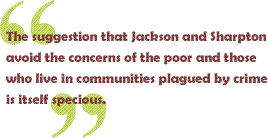 After
the elections of November 2002, Sheryl McCarthy (Newsday,
11/7/02) argued that one reason why the Democrats fared so badly
was that "instead of going to Florida, getting out the black
voters and avenging all those people who were disenfranchised
the last time around, the Revs. Jesse Jackson and Al Sharpton
were busy complaining about a movie." While it is true that
Jackson and Sharpton, among others, objected to elements of the
film Barbershop, Jackson was in Florida during the
days before the election, doing just what McCarthy claimed he
avoided: rallying voters, particularly those discouraged by the
2000 election (Florida Times-Union, 11/5/02).
After
the elections of November 2002, Sheryl McCarthy (Newsday,
11/7/02) argued that one reason why the Democrats fared so badly
was that "instead of going to Florida, getting out the black
voters and avenging all those people who were disenfranchised
the last time around, the Revs. Jesse Jackson and Al Sharpton
were busy complaining about a movie." While it is true that
Jackson and Sharpton, among others, objected to elements of the
film Barbershop, Jackson was in Florida during the
days before the election, doing just what McCarthy claimed he
avoided: rallying voters, particularly those discouraged by the
2000 election (Florida Times-Union, 11/5/02).
Others
claim that Jackson and Sharpton do not regularly address the everyday
problems of African-Americans. Stanley Crouch maintained in the
Los Angeles Times (2/3/02) that "the civil-rights
establishment, symbolized by the Rev. Jesse Jackson, is consistently
removed from the greatest problems weighing upon the communities
it purportedly represents." Crouch argued that "we are
accustomed to seeing Jackson attach himself to controversies,
specious and real,"  but
"we are not accustomed to seeing" him "taking on
problems facing Afro-Americans that are far greater than the threats
of racist murder or police homicide," such as the "unprecedented
crisis of violence" within the African-American community.
Similarly, Tony Norman of the Pittsburgh Post-Gazette (10/29/02)
asserted, "Last month, Jesse Jackson and Al Sharpton marshaled
what was left of their rapidly dwindling moral authority to take
on – poverty? No! – urban violence? No! – a movie [Barbershop]?
Yes!"
but
"we are not accustomed to seeing" him "taking on
problems facing Afro-Americans that are far greater than the threats
of racist murder or police homicide," such as the "unprecedented
crisis of violence" within the African-American community.
Similarly, Tony Norman of the Pittsburgh Post-Gazette (10/29/02)
asserted, "Last month, Jesse Jackson and Al Sharpton marshaled
what was left of their rapidly dwindling moral authority to take
on – poverty? No! – urban violence? No! – a movie [Barbershop]?
Yes!"
The
suggestion that Jackson and Sharpton avoid the concerns of the
poor and those who live in communities plagued by crime is itself
specious. In frequent editorials in various newspapers, Jackson
has addressed economic concerns, particularly the plight of America’s
poorest workers. Sharpton frequently speaks out against violence,
often in response to specific incidents. After a mob beat two
men to death after a traffic accident in Chicago in July 2002,
for example, Sharpton visited the neighborhood, appearing with
ministers to denounce the crime. Jackson and Sharpton both attended
a gang violence conference in Chicago in November 2001. One may
support or reject their positions, but it is untenable to suggest
that Jackson and Sharpton ignore such issues.
No-win
standards
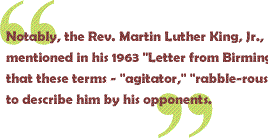 Indeed,
critical readers might discover that conflicting standards are
used to judge the responses of progressive African-American spokespersons
to various causes. They are charged with ignoring the problems
of minorities, the poor or working people, yet when they get involved
in a cause, they are deemed self-serving or divisive. Steve Barrett
(Chattanooga Times/Free Press, 9/13/02) dismissed
Jackson’s visit to Pacific Coast dockworkers in support of their
strike as "agitation" that "makes the union’s demands
more suspect." Suzanne Fields of the Washington Times
(12/30/02) argued that Jackson and Sharpton seem "trapped
in a deadlocked ideology that suggests that only black rabble-rousers
have the right to formulate the solutions to the problems of the
black underclass." (Notably, the Rev. Martin Luther King,
Jr., mentioned in his 1963 "Letter from Birmingham Jail"
that these terms – "agitator," "rabble-rouser"
– were used to describe him by his opponents.) In effect, the
media place these leaders in a double bind: Whatever they do,
they just cannot win. As a result, an honest examination of the
issues they raise is often doomed from the outset.
Indeed,
critical readers might discover that conflicting standards are
used to judge the responses of progressive African-American spokespersons
to various causes. They are charged with ignoring the problems
of minorities, the poor or working people, yet when they get involved
in a cause, they are deemed self-serving or divisive. Steve Barrett
(Chattanooga Times/Free Press, 9/13/02) dismissed
Jackson’s visit to Pacific Coast dockworkers in support of their
strike as "agitation" that "makes the union’s demands
more suspect." Suzanne Fields of the Washington Times
(12/30/02) argued that Jackson and Sharpton seem "trapped
in a deadlocked ideology that suggests that only black rabble-rousers
have the right to formulate the solutions to the problems of the
black underclass." (Notably, the Rev. Martin Luther King,
Jr., mentioned in his 1963 "Letter from Birmingham Jail"
that these terms – "agitator," "rabble-rouser"
– were used to describe him by his opponents.) In effect, the
media place these leaders in a double bind: Whatever they do,
they just cannot win. As a result, an honest examination of the
issues they raise is often doomed from the outset.
Similarly,
when progressive African-American spokespeople take someone to
task for what they believe are inappropriate remarks, they are
often told to lighten up and to respect free speech. Calling Jackson’s
and Sharpton’s objections to comments in the movie Barbershop
about Rosa Parks and Martin Luther King, Jr. a "petty snit,"
E.R. Shipp (New York Daily News, 9/29/02) demanded, "Isn't
free speech one of the rights Jesse has made it his life's work
to uphold?" Rod Dreher (National Review Online, 9/25/02)
remarked that "it's absurd to claim that any human being
has the right to be spared any negative commentary at all."
Yet
the "free speech" standard frequently disappears when
African-American leaders are the ones making the comments others
consider offensive. After Jackson said at Michigan State University
that democracy in America was created by the Voting Rights Act
of 1965, not by the Founding Fathers, Fox News Channel’s
Sean Hannity (Hannity & Colmes, 9/16/02) asked, "What
is Jesse Jackson's problem with our nation's founding fathers?
You won't believe what he had to say this weekend." When
Cornel West described New York Democratic gubernatorial candidate
H. Carl McCall as "a hesitant brother" and "a timid
brother," the New York Post (8/27/02) attacked West
for "race-baiting" and declared that he was "racializ[ing]
a campaign" that previously was "relatively benign in
that respect."
Why
do mainstream media approach progressive African-American leaders
with such evident contempt and disingenuousness? Why are they
so reluctant to engage their arguments, preferring instead to
ridicule and misrepresent them? Why do they apply impossibly contradictory
standards to them? Perhaps the answer lies in the challenges that
these leaders present to American society.

Commenting
on NPR’s Tavis Smiley Show (7/25/02) on the media’s
reaction to statements made by Jesse Jackson about police brutality,
professor and commentator Michael Eric Dyson remarked, "The
reason Rev. Jackson is being placed under such scrutiny here is
because he’s pointing to something that the powers that be don’t
want to hear about ... so they have to kind of discredit him and
call him a part of the lunatic fringe." Dyson’s comments
can be extended to explain coverage of other progressive African-American
leaders: Media frequently do not want to seriously consider the
ideas of those who challenge the status quo, particularly on issues
related to race. Rather than allow them to speak for themselves,
they disparage or distort their ideas. Instead of examining racist
assumptions, many commentators exploit these biases.
Such
treatment constitutes a challenge for African-American public
figures. Sharpton explained in Al on America, "When the media
began portraying me as a buffoon, it never bothered me, because
... I defined myself long ago. I always defined my own terms."
He said he follows the advice singer James Brown gave to him:
"If you start letting people define who you are, people will
then decide what is credible and what is not. And you never give
them that, Rev. You may suffer, but you never give them that."
Jacqueline
Bacon, the author of The
Humblest May Stand Forth: Rhetoric, Empowerment and Abolition
(University of South Carolina Press, 2002), has written articles
for various publications on African-American rhetoric and history.

